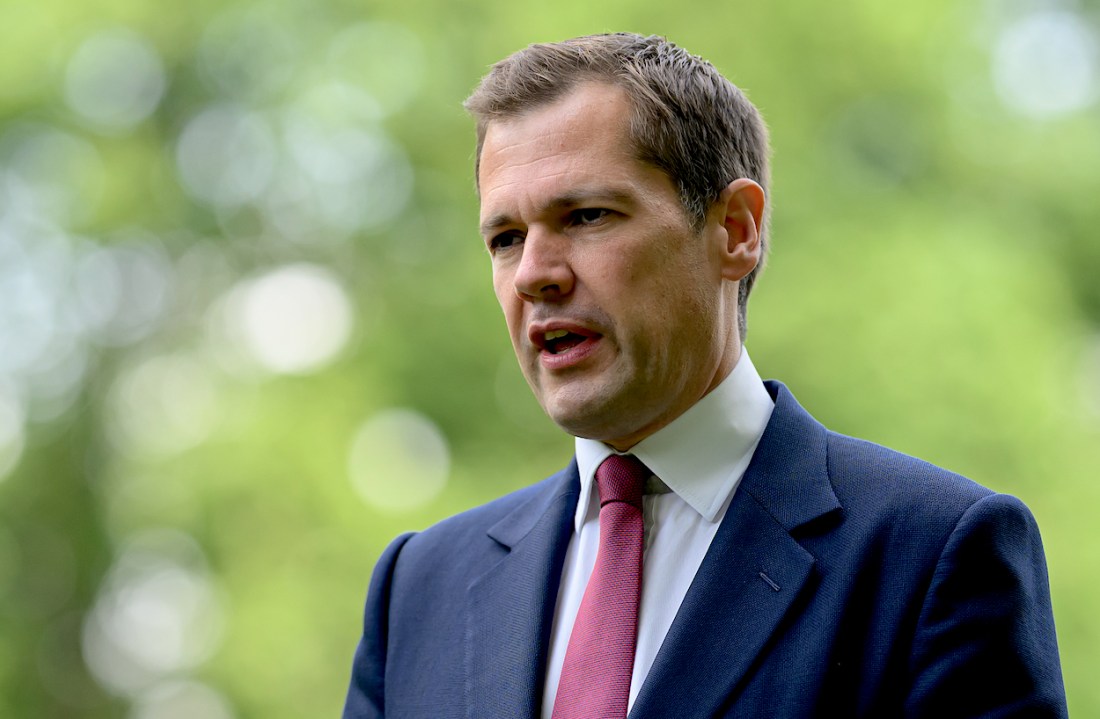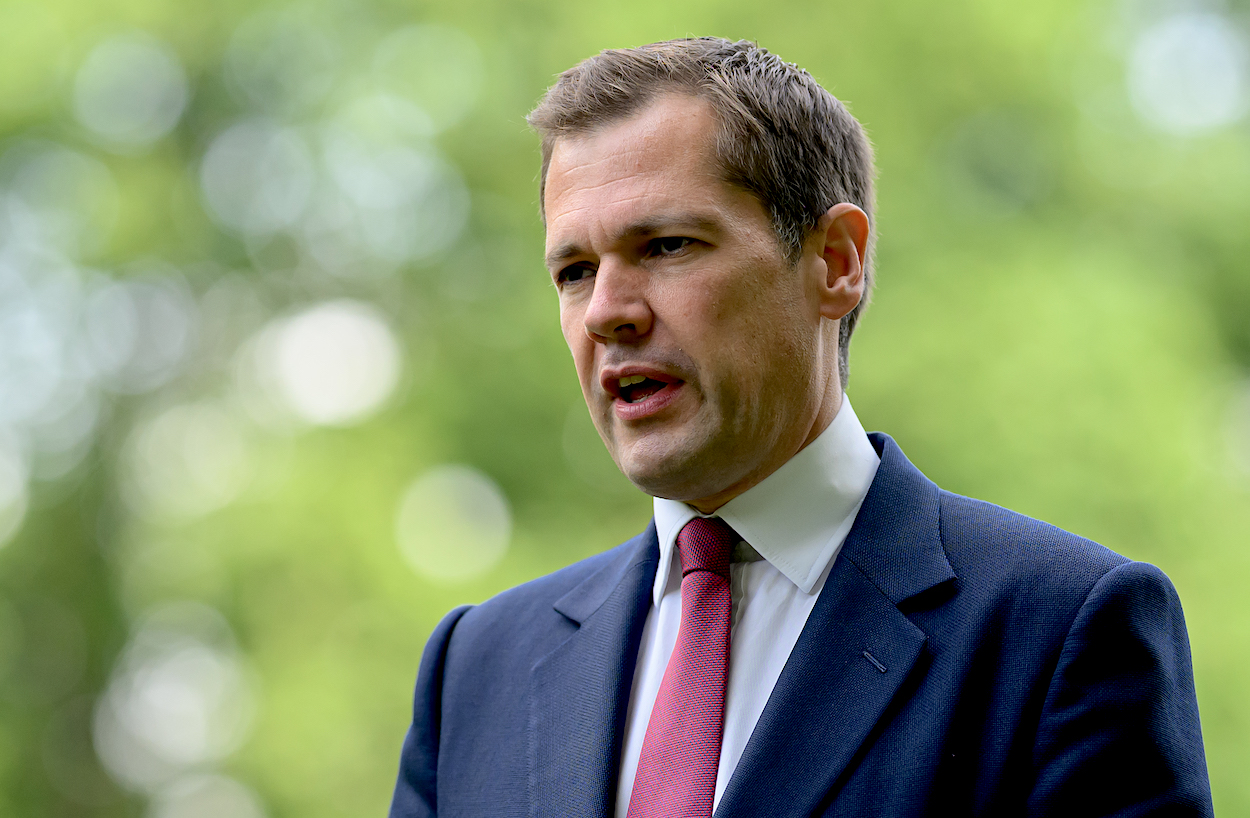Robert Jenrick has warned that he is ‘absolutely terrified’ Britain is heading for a debt crisis ‘unless Rachel Reeves changes course very quickly’. ‘That will be a financial crisis of a scale akin to what we experienced in 2008,’ he warned. ‘That will mean tens of thousands of homeowners potentially facing the repossession of their homes, thousands of people being made homeless, thousands of small businesses facing debt repayments they just cannot handle.’
This crisis, he predicted, is ‘coming in the next 12 months’, and the Conservative response to it must be that ‘the state is too large and we have to cut it… above all else in welfare.’ Labour, he argued, could not make even small changes to benefits and it would be down to ‘a centre-right government after the next election’ to tackle the problem, but with potentially ‘devastating’ consequences in the meantime. It was notable that Jenrick did not say this needed to be a Tory government.
Jenrick was speaking at a conference on what the right can learn from America hosted by The Spectator at the Unherd Club. It came on the day that the debt figures showed the government borrowed £165 billion in the first five months of the year, £11bn more even than the OBR predicted in March.
The shadow justice secretary, with one of his regular forays off his own political piste, stressed that the British Conservatives must take a different economic approach to their Republican cousins in America, where the Trump administration has chosen to borrow more. Jenrick and Nick Timothy also called for Britain to ‘reindustrialise’, something which is much more clearly from the Trump playbook. This, they argued, means ‘a totally different energy policy’ (commercial energy costs are four times those in the US), including junking the Climate Change Act and building new gas-fired power stations, exploiting North Sea fossil fuels and ‘exploring fracking’.
Jenrick also called for Britain to emulate the US on housing and planning, where tens of thousands of homes are being thrown up in states such as Texas and Florida – while just 23 new homes were sold in London in April. Most of all, he said the UK needs to emulate the US in refuting the economic model which dictated that growth was driven by migration. ‘It has been a total disaster,’ he said. If the model had been correct ‘we would have had the greatest economic growth since the industrial revolution’. This means, as Jenrick said in a recent Spectator interview, ‘net emigration’.
The gauntlet was thrown down to the Brits in the opening session of the day, when Oren Cass, the former Romney campaign operative who set up American Compass, the conservative think tank, set out three major lessons British conservatives need to learn from Trump’s success. He argued that they have to face up to the fact that the coalitions created by Ronald Reagan and Margaret Thatcher in the 1980s are dead and that they need to embrace the fact that their support now comes from elsewhere.
He argued that the need to win the Cold War brought together conservatives with free market libertarians and foreign policy hawks and that the latter two groups aren’t really conservatives at all. He said it was ‘ludicrous’ to regard Milton Friedman and Friedrich Hayek (the high priests of centre-right economics in the 1980s) as any kind of guide to economics now. Similarly, following ‘foreign policy interventionists’ and ‘adventurists’ had led to ‘terrible’ foreign policy outcomes. Advocating free trade, he argued, ‘makes very little sense’ and embracing China was ‘a terrible decision’. Cass suggested Trump and Brexit represented the ‘final collapse’ of these coalitions and of the ‘elite leadership’ which perpetuated these ideas for their own benefit.
Cass then spelt out three principles the British right should base their new offer on:
- Productive markets: Markets, Cass argued, have not delivered what was promised by the libertarians to the people. Government has to do more than just get out of the way.
- Supportive communities: Conservatives have mouthed platitudes for years about the need to support families and communities, but now need to be seen by voters to actually do something about it, rather than devise economic policies which just ‘treat them as atomised individuals’. Cass argued that the right should try to reform and co-opt labour unions in the private sector rather than cheer their demise and also devise pro-family policies.
- Responsive politics: Cass’s argument was that to be successful the right must now reverse how it has fought and campaigned for decades. ‘The task of politics is to be responsive to people’s preferences,’ Cass said. Previously, he said, elites built a movement with ideas which suited and benefited them, then worked out how to win elections by using polling to persuade voters that it would be good for them too. This, he claimed, was ‘a disaster for the people, who were sceptical all along’. He argued that instead of trying to persuade workers that what is good for their bosses is good for them, conservatives should try to persuade bosses that what is good for their workers is also good for their companies. Only by doing demonstrably pro-worker things could they earn their trust – as Trump has done by acting on migration as he promised he would.
Cass then had three lessons for how the British right should campaign:
- Ideas matter: ‘Showing up with winning arguments actually works,’ Cass said. They help you form a movement, they help you market your movement.
- Conflict is good: ‘Confrontation – that’s what politics is,’ argued Cass. Voters, he said, are sick of politicians who claim everything is a win-win. Instead, the right should spell out the trade-offs involved in each decision and explain who the winners and losers are. ‘Deciding who is outside your coalitions is just as important as who is in.’
- Be unpleasant: ‘There is nothing to be gained by going along to get along,’ Cass argued. This means developing policy which has winners and losers and upsets your friends and allies. In Britain’s case, he argued that the Tories need to go after the City of London, rather than pamper it.
These were not all easy messages for the British politicians in the room to hear. Some were inherently uncomfortable with the idea of killing the golden goose of taxation in the financial services industry. Others found the isolationist tint of Cass’s comments on foreign policy disturbing. But many seemed persuaded that Trump has shown that they need to be more willing to be bold and to embrace the British public where they find them.
At its heart, Cass’s argument and the basis of the discussion was that there has been a realignment of voters on both sides of the Atlantic, with poorer and less-educated voters veering to the right over the years. The pollsters, however, had several correctives to this picture. James Kanagasooriam of Focaldata pointed out that while the change has been steady and consistent in the US since Reagan’s day, in the UK it has lurched around like a rollercoaster from one election to the next.
Luke Tryl of More in Common urged Tories not to try to play demographic games with the electorate, and argued that when his firm tried to draw up a picture of the typical Reform voter at the local elections, they found the profile was exactly the same as the typical voter in general. Having a proper and persuasive argument on the cost of living and migration, the issues most voters care about, would move votes across the board. ‘We can overthink this,’ he warned. The most striking thing about voters is not who they are or where they’re from, but the fact they are ‘just miserable’ and ‘pissed off’ at their lives and the failures of successive governments.
While pretty much everyone at the conference thought there were things to learn from Trump’s feral sense of the voter, his innovation in communications and his determination to deliver what he promised, Tryl also warned that British conservatives should be wary of importing every issue that energises the MAGA movement. One of the ‘biggest mistakes of the progressive left’ in Britain, he argued, was to ‘import US frames of reference’ – on critical race theory and trans rights – into the UK, where there was a much less receptive audience. The right would be making the same mistake if it veered from cost of living to obsess about freedom of speech, he said, citing the case of Lucy Connolly, who was jailed for tweets around last year’s riots. While most voters accept there is a debate to be had about the justice of her sentence, Tryl said: ‘What there isn’t is a constituency for embracing her as a hero.’
Tom Lubbock of JL Partners, the pollster which most accurately predicted Trump’s second victory, agreed with the others that voter allegiance in the UK is highly volatile and could switch again. ‘Voters pursue the cab on the rank and the next cab is Reform.’ But he argued that responding to where the voters are does not mean political parties are passengers of the public whim. Trump, he argued, ‘helped create’ whatever realignment there has been in the US. ‘Leadership offers a way out.’
With both the Tories and Labour entering their party conferences in the next fortnight, and with a real possibility that those gatherings might be Kemi Badenoch and Keir Starmer’s last as party leader, this may have been the biggest food for thought of the entire day. Given the broad set of proposals offered by Jenrick, he probably thinks so too.









Comments